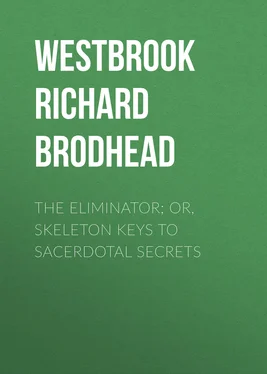Richard Westbrook - The Eliminator; or, Skeleton Keys to Sacerdotal Secrets
Здесь есть возможность читать онлайн «Richard Westbrook - The Eliminator; or, Skeleton Keys to Sacerdotal Secrets» — ознакомительный отрывок электронной книги совершенно бесплатно, а после прочтения отрывка купить полную версию. В некоторых случаях можно слушать аудио, скачать через торрент в формате fb2 и присутствует краткое содержание. Жанр: foreign_prose, foreign_religion, Философия, foreign_psychology, foreign_antique, на английском языке. Описание произведения, (предисловие) а так же отзывы посетителей доступны на портале библиотеки ЛибКат.
- Название:The Eliminator; or, Skeleton Keys to Sacerdotal Secrets
- Автор:
- Жанр:
- Год:неизвестен
- ISBN:нет данных
- Рейтинг книги:3 / 5. Голосов: 1
-
Избранное:Добавить в избранное
- Отзывы:
-
Ваша оценка:
- 60
- 1
- 2
- 3
- 4
- 5
The Eliminator; or, Skeleton Keys to Sacerdotal Secrets: краткое содержание, описание и аннотация
Предлагаем к чтению аннотацию, описание, краткое содержание или предисловие (зависит от того, что написал сам автор книги «The Eliminator; or, Skeleton Keys to Sacerdotal Secrets»). Если вы не нашли необходимую информацию о книге — напишите в комментариях, мы постараемся отыскать её.
The Eliminator; or, Skeleton Keys to Sacerdotal Secrets — читать онлайн ознакомительный отрывок
Ниже представлен текст книги, разбитый по страницам. Система сохранения места последней прочитанной страницы, позволяет с удобством читать онлайн бесплатно книгу «The Eliminator; or, Skeleton Keys to Sacerdotal Secrets», без необходимости каждый раз заново искать на чём Вы остановились. Поставьте закладку, и сможете в любой момент перейти на страницу, на которой закончили чтение.
Интервал:
Закладка:
If ministers would give up the holy-orders idea, cast into the sea the millstone incumbrance of pecuniary dependence, engage earnestly in some legitimate work to support themselves, they would then for the first time begin to realize what soul-freedom is, and they could then preach with an intelligence and power and with a satisfaction to themselves of which they now know nothing. Let them try it for themselves and learn a lesson. Whether the clerical order is so divine an institution that we have no right to call it into question or to abolish it altogether, is a question that must be practically considered soon.
There is a deep impression widely prevailing among thoughtful and sincerely religious persons that the infidelity of the pulpit is largely responsible for the prevailing skepticism of the age. The word “infidelity” is here specially used in a strict philological sense— infidele , not faithful, unfaithfulness to a trust—but it is also used in its more general sense of disbelief in certain religious dogmas.
We impeach and arraign the clergy (admitting a few honorable exceptions) on the general charge of infidelity in the strictest and broadest sense of the word—
1st. In that they fail to qualify themselves to be the leaders of thought in the great, living questions affecting religion and morality. We have elsewhere said: “Not one minister in a thousand ‘discerns the signs of the times’ or is prepared for the crisis. Few pastors ever read anything beyond their own denominational literature. Their education is partial, one-sided, professional. They cling to mediaeval superstitions with the desperate grasp of drowning men. The great majority of the clergy are not men of broad minds and wide and deep research, and have not the ability to meet the vexed questions of to-day.”
It is an admitted policy, especially among the orthodox clergy (so called), not to read or to listen to anything that might unsettle their faith in what they have accepted as a finality; whereas no man can intelligently believe anything until he has candidly considered the reasons assigned by other men for not believing what he does. “He that is first in his own cause seemeth just; but his neighbor cometh and searcheth him.”
Professor Fisher, the champion of Yale-College orthodoxy, has recently admitted in the North American Review that at least one of the causes of the decline of clerical authority and influence is the increased intelligence of the laity. If the people cannot get what they desire from the pulpit, they will seek it from the platform and the press. Truth is no longer to be concealed in cloisters and smothered in theological seminaries, but it is to be proclaimed from housetops and in language understood in every-day life.
It was once said that “the lips of the priest give knowledge,” but it may now be truly said that modern scientists and philosophers among the laity are the principal teachers of mankind, and that publications like the North American Review and The Forum , and last, but not least, the secular daily newspapers, are doing more to instruct the people in living truths than the whole brood of ecclesiastical parrots.
2d. We charge that many professional clergymen suppress things which they do believe to be true, and not unfrequently suggest things, at least by implication, which they do know to be false.
Dr. Edward Everett Hale recently published an article in the North American Review entitled “Insincerity in the Pulpit;” and the Rev. Dr. Phillips Brooks of Boston, who recently received episcopal honors in Massachussetts, has confirmed in the Princeton Review what Dr. Hale charged in the North American Review regarding clerical disingenuousness. Dr. Brooks wrote thus:
“A large acquaintance with clerical life has led me to think that almost any company of clergymen, talking freely to each other, will express opinions which would greatly surprise, and at the same time greatly relieve, the congregations who ordinarily listen to these ministers.... How many men in the ministry to-day believe in the doctrine of verbal inspiration which our fathers held? and how many of us have frankly told the people that we do not believe it?… How many of us hold that the everlasting punishment of the wicked is a clear and certain truth of revelation? But how many of us who do not have ever said a word?”
The same principle of prevarication and deceit was practised by the early Fathers of the Christian Church, who not only concealed the truth from the masses of the people, but did not hesitate to deceive and mislead them.
Mosheim, an ecclesiastical historian of high authority, testifies that “in the fourth century it was an almost universally adopted maxim that it was an act of virtue to deceive and lie when by such means the interests of the Church might be promoted.” He further says of the fifth century, “Fraud and impudent imposture were artfully proportioned to the credulity of the vulgar.”
Milman, in his History of Christianity , says: “It was admitted and avowed that to deceive into Christianity was so valuable a service as to hallow deceit itself.” He further says in the same historical work, “That some of the Christian legends were deliberate forgeries can scarcely be questioned.” There is not a Bible manuscript or version that has not been manipulated by ecclesiastics for century after century. Many of these priests were both ignorant and vicious. From the fifth to the fifteenth century crimes not fit to be mentioned prevailed among the clergy.
Dr. Lardner says that Christians of all sorts were guilty of fraud, and quotes Cassaubon as saying, “In the earliest times of the Church it was considered a capital exploit to lend to heavenly truth the help of their own inventions.” Dr. Thomas Burnet, in a Latin treatise intended for the clergy only, said, “Too much light is hurtful to weak eyes;” and he recommended the practice of deceiving the common people for their own good. I know that this same policy is in vogue in our day. This same nefarious doctrine of the exoteric and esoteric, one thing for the priest and another for the people, is far from being dead in this nineteenth century. It has always been, and now is, the real priestly policy to keep the common people in ignorance of many things; and if all do not accept the maxim of Gregory, that “Ignorance is the mother of Devotion,” many ministers privately hold in our day that “where ignorance is bliss ’Tis folly to be wise.”
3d. The third article of impeachment, under the general charge of infidelity is, that sacerdotalists teach dogmas which they do not believe themselves. They do not all believe, ex animo , the distinctive dogmas of the orthodox creeds—that God is angry with the great body of mankind, that his wrath is a burning flame, and that there is, as to a majority of men, but a moment’s time and a point of space between them and eternal torture more terrible than imagination can conceive or language describe. It is well said that “Actions speak louder than words;” and we need only ask the question, “Do ministers who profess to believe these horrible dogmas preach as if they really believed them?” Notice the general deportment of the clergy at the summer resort, at the seaside, or on the mountain-top, and say whether they can possibly believe what for eight or nine months they have been preaching in their now closed churches. Listen to the private conversation of our evangelists at the camp-meeting or at the meetings of ecclesiastical bodies, and then conclude, if you can, that they believe what they teach.
Take, if you please, the case of one of our best-known evangelical ministers, a member of the strictest of our orthodox sects, who spends a large proportion of his time in studying the ways of insects, and who would chase a pismire across the continent to find out its habits. Can a pastor believe in his heart the dogmas of the Westminster Confession, and yet devote so much time to ants? It is impossible. He may deceive himself; he cannot deceive others.
Читать дальшеИнтервал:
Закладка:
Похожие книги на «The Eliminator; or, Skeleton Keys to Sacerdotal Secrets»
Представляем Вашему вниманию похожие книги на «The Eliminator; or, Skeleton Keys to Sacerdotal Secrets» списком для выбора. Мы отобрали схожую по названию и смыслу литературу в надежде предоставить читателям больше вариантов отыскать новые, интересные, ещё непрочитанные произведения.
Обсуждение, отзывы о книге «The Eliminator; or, Skeleton Keys to Sacerdotal Secrets» и просто собственные мнения читателей. Оставьте ваши комментарии, напишите, что Вы думаете о произведении, его смысле или главных героях. Укажите что конкретно понравилось, а что нет, и почему Вы так считаете.












